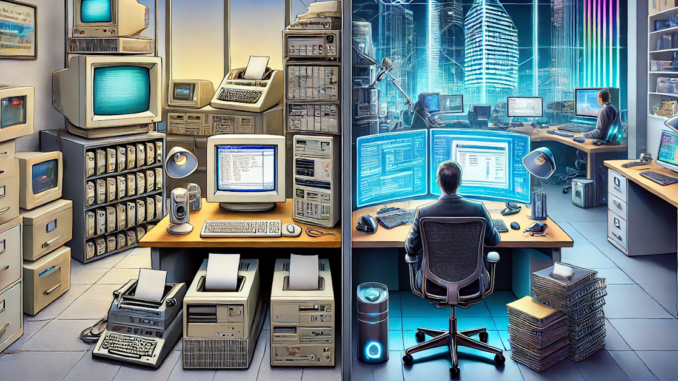
A Familiar Technological Shift
Do you remember the first time you connected to the internet? The anticipation, the long wait, the screech of the dial-up modem, and that fleeting moment of triumph when the page finally loaded? Maybe it was logging into your first email account, setting up an AOL screen name, or experiencing the magic of Netscape Navigator.
For many in Gen X, that moment was our first taste of digital transformation. We went from cassette tapes to CDs, from Nokia bricks to smartphones, from static HTML pages to fully interactive platforms. We didn’t just watch technology evolve—we adapted with it, rewired our skill sets, and reshaped entire industries along the way.
Now, we’re facing another shift, one that feels just as monumental: artificial intelligence (AI). But unlike previous waves of change, this time, we’re not learning from scratch. We’ve seen the patterns before, and we know how to ride the wave—not be drowned by it.
AI’s Role: Augmentation, Not Replacement
There’s no shortage of dramatic headlines declaring that AI is coming to steal our jobs. But we’ve heard this before.
- “Excel will replace accountants.” (1990s)
- “E-commerce will kill the high street.” (2000s)
- “Automation will make human workers obsolete.” (2010s)
Each time, the reality was more nuanced. AI, like every major technology before it, isn’t replacing entire careers—it’s reshaping the work we do and forcing us to level up.
Here’s how AI is already transforming industries:
- Automating Routine Tasks – AI is taking care of scheduling, data entry, and documentation, freeing up time for strategic thinking.
- Enhancing Creativity – From AI-assisted design tools to generative writing assistants, we’re not being replaced—we’re being amplified.
- Democratising Data – AI-powered analytics are giving non-specialists access to insights once reserved for data scientists.
- Evolving Customer Service – Chatbots handle basic queries, allowing humans to focus on complex, high-empathy interactions.
AI doesn’t replace people—it replaces tasks. The roles most at risk are those that rely solely on repetitive, predictable processes without human insight.
Your Take: Do you see AI as an opportunity or a threat?
[Opportunity] [Both] [Threat]
Gen X: The Best-Prepared Generation for AI
Younger generations may have been born into a digital world, but we built it. That gives us a unique edge when it comes to navigating AI’s impact on work.
- We know how to adapt – We transitioned from analogue to digital, paper to PDFs, offline to always-on. Learning new tools isn’t new—it’s just the next iteration.
- We’re naturally sceptical – Unlike digital natives, we don’t blindly trust every new tech trend. That means we question AI’s limitations, making us better at using it strategically.
- We’ve already upskilled before – From learning Excel macros in the 90s to adapting to social media marketing in the 2010s, we know how to stay ahead of the curve.
- We understand business structures – AI won’t succeed just because it’s powerful—it needs to be integrated into real-world workflows. Our experience in corporate environments gives us the practical edge younger workers may lack.
Put simply, we’re the last generation that remembers life before the internet. That perspective is invaluable in understanding how AI should be shaped, not just adopted.
How to Stay Ahead in the AI Era
So, how do we future-proof ourselves? The answer isn’t to resist AI—but to learn how to work with it.
For Professionals
- Experiment with AI – The best way to learn is by using it. Try AI-powered tools for writing, design, or automation in your daily work.
- Automate Low-Value Tasks – Let AI handle the mundane, so you can focus on creativity, strategy, and decision-making.
- Sharpen Your Human-Centric Skills – Empathy, storytelling, leadership—these will always be in demand.
- Leverage AI for Career Growth – Use AI as a force multiplier, helping you work smarter, not harder.
For Organisations
- Invest in AI Training – AI isn’t just for specialists—everyone in the workplace needs AI literacy.
- Redesign Workflows – AI should be a tool, not a replacement. Human-AI collaboration is key.
- Encourage Experimentation – The companies that thrive will be those that allow employees to test and integrate AI tools freely.
- Develop Ethical AI Frameworks – AI isn’t just about productivity—it’s about trust and responsible adoption.
Looking Ahead: AI is the Next Internet
When the internet first arrived, some professionals ignored it and got left behind. Others embraced it and used it to redefine their careers.
AI is following the same trajectory, but at a much faster pace. By 2035, many of today’s job roles won’t exist in their current form. But what will remain unchanged is the value of human ingenuity.
We’ve adapted before, and we will again. The question isn’t whether AI will change your career—it’s how you will shape that change.
Your Turn: Let’s Talk AI
What was the first task you ever automated? Drop a comment below.
Have you used AI in your job yet?
[Yes] [No, but curious] [Not yet, and not convinced]

Leave a Reply